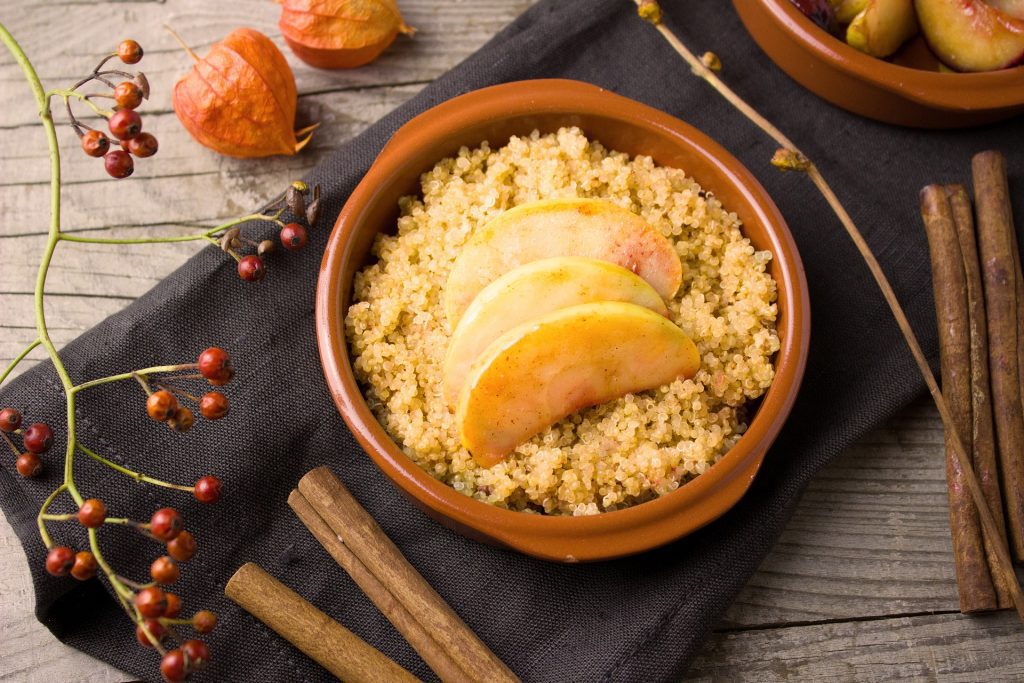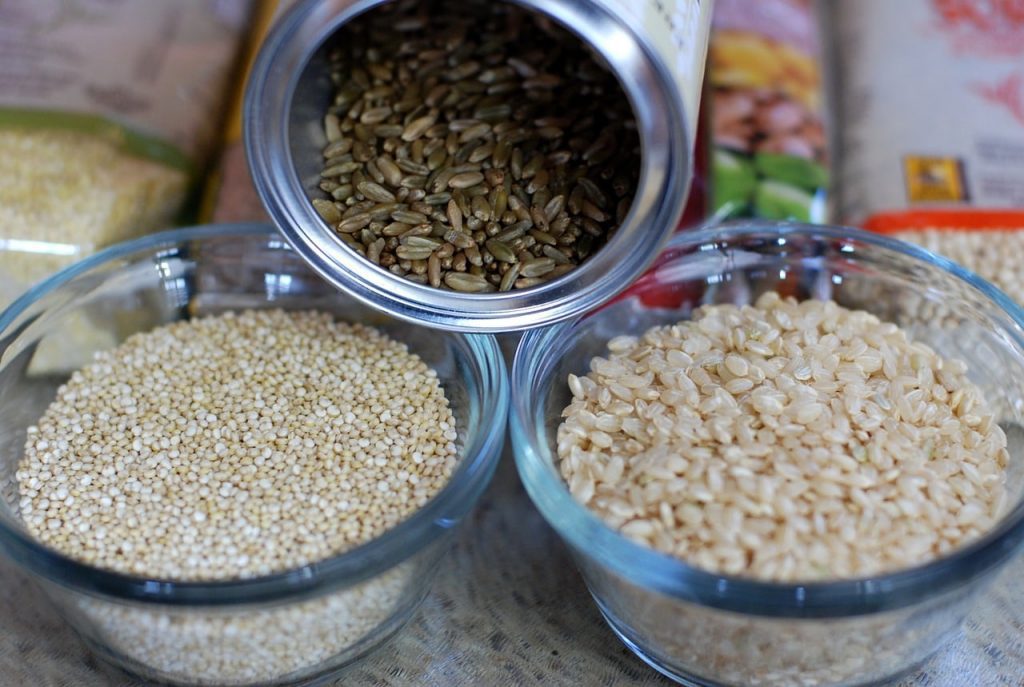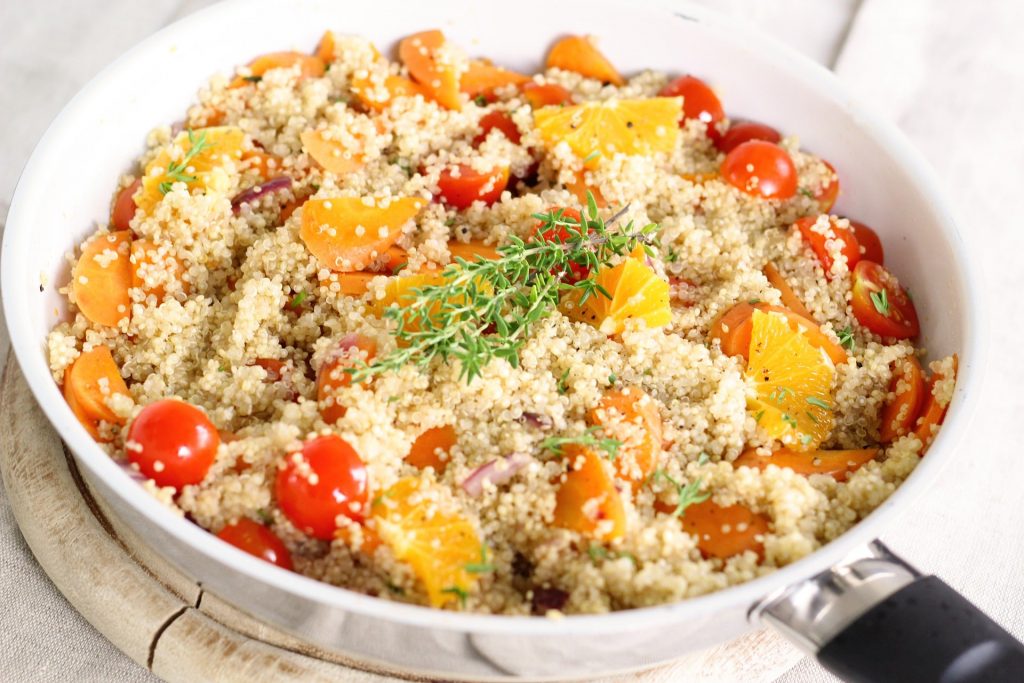A super-grain like quinoa hardly escapes anyone’s radar when they are in search of a healthy addition to their diet. Quinoa, a gluten-free grain, unlike wheat and rice, is not a cereal but is considered as a pseudo-cereal, and is botanically related to spinach (yes!).
The health benefits associated with the consumption of quinoa have been credited for making it one of the most beneficial grains available in the market. Quinoa is mostly consumed after being cooked in water much like rice; it is rich with nutrients like minerals, vitamins, and amino acids but there is a significant reason why experts believe that eating quinoa can lead to weight loss.
Let us take a look at what more the addition of quinoa can do to your health.
Table of Contents
Watch: Amazing Health Benefits Of Quinoa
Health Benefits Of Quinoa
1. Weight Loss
If you are looking for a food item that can effectively aid you in losing some kilos, then quinoa might just be the right choice for you. Typically high on fiber, as compared to other grains such as wheat and rice, the consumption of quinoa can help in the slowing down of the metabolism.
Fiber, which is the indigestible part of the food, tends to make it harder for the stomach to digest the whole food item when consumed (1). Due to this, the effort and calories spent by the body in order to digest a fiber-rich food are more than what it acquires in the first place.
This makes quinoa a negative calorie food and makes it quite effective for losing weight. It helps in the burning of calories while providing you enough protein and fiber.
2. A Natural Anti-Inflammatory
One of the most important compounds produced in the body after the consumption of quinoa is called butyrate. It is an important fatty acid that helps in reducing the inflammatory response of the cells and tissues in the body (2).
Other compounds such as saponins, whose production is also linked with adequate consumption of quinoa, can aid due to their natural anti-inflammatory properties.
Related Reading: We review products over days, and sometimes weeks, so you can shop better. Read our Best Quinoa Brand To Buy Review here.
3. Effectively Tackles Diabetes
Again, thanks to the fiber-loaded nature of quinoa, its addition to one’s diet is linked with the deceleration of rising blood sugar levels. As it is harder for the body to digest a food item that is rich with fiber, the metabolism starts to slow down.
Due to this, the nutrients from the consumed food, including sugar, carbohydrates, and fats, are absorbed at a rather slower rate. Thus, it gives the organs enough time for an adequate secretion for the digestive juices for effective digestion.
Insulin, for example, helps in the breaking down of sugar molecules in the blood and helps in the lowering of the blood sugar level. Consumption of quinoa, a fiber-rich grain, helps in decreasing the insulin resistance of the body and effectively lowers the blood sugar level.

4. Promotes Cardiovascular Health
Cholesterol level is one of the major sources of worry, especially among those battling other associated risks like obesity and diabetes. To find a food item that can help you keep your cholesterol level in check might be quite hard to find, but quinoa could be perfect for it.
The reason behind this is simple. Quinoa, when consumed, is responsible for combining with the bile acids that are present in the liver, and the resulting jelly-like compound is then excreted in the bowels. So, what are these bile-acids in the liver?
Well, they are the product of the combination of bile-juice (which is produced by the liver) and the cholesterol that is present in the blood. Thus, when these bile acids are removed from the liver, the liver takes in more cholesterol from the blood in order to produce more of the bile-acid, which results in the lowering of the blood’s cholesterol level and helps in promoting great cardiovascular health.
Also Read: A To Z Of Antioxidant-Rich Food | Top 9 Heart Friendly Foods
5. Increases Digestive Health
After listing down all of the health benefits associated with the consumption of quinoa, its benefit in promoting the digestive health appears to be quite self-explanatory. Being rich in fiber, quinoa helps in the effective and efficient digestion of the food that’s been consumed and promotes the absorption of nutrients by the small intestines.
Moreover, the presence of vitamin B further increases its efficiency in doing so. The consumption of vitamin B is linked with the production of hydrochloric acid, which as we all know, is the chemical present in the inner lining of the stomach that helps in the digestion of food.
6. Aids In Healing And Tissue Repair
This is one of the unique properties among all the other grains that only quinoa has, for it is rich with a compound called lysine, which is beneficial when it comes to promoting tissue repair and fastening the body’s healing process.
Lysine is an important and essential amino acid that isn’t produced by the body and must be externally consumed. Adequate consumption of lysine is linked with a higher production of collagen, a protein that is used by the various connective tissues of the body (3).
Thus, the addition of quinoa into your regular diet can be quite beneficial and might also increase the tissue repairing functions of the body.
7. Prevents Osteoporosis
Osteoporosis is a disease that is usually linked with old age. Its symptoms include weak and brittle bones, back pains, and the loss of height. A healthy diet, however, could actually help in preventing or delaying it.
The addition of quinoa into your daily regime, thanks to the various nutritional compounds present in it, can effectively help in preventing such bone degenerative diseases. Being rich in magnesium, a compound that acts as a great nutrient for bone health, and also loaded with proteins, the building block for the bones, there is no doubt that quinoa seeds can be highly beneficial regarding the health of the bones.
8. Prevents Anemia
Apart from being loaded with magnesium, if there is another mineral that is abundantly present quinoa, it is iron. Iron plays an important role in the development of one’s body.
For one, its consumption corresponds with the increased production hemoglobin in the blood, a cell that acts as the oxygen carriers and adequately supplies oxygen to different organs of the body for proper functioning.
Thus, eating quinoa increases the supply of oxygen in one’s body and can effectively prevent the occurrence of any disease caused by oxygen-deficiency, for example, anemia.
9. Rich In Quercetin And Kaempferol
Quercetin and Kaempferol are two plant compounds that are abundantly present in a bowlful of quinoa. These two compounds are rich anti-oxidants and are basically responsible for giving quinoa its anti-oxidant nature. Anti-oxidants are most commonly known as free-radical scavengers.
The free-radicals, or the free-oxygen atoms, tend to combine with the healthy cells and cause oxidative stress over the cell walls, which causes the healthy cells to get damaged.
However, anti-oxidants, when introduced into the system, combine with these free-radicals before they get a chance to come in contact with a healthy cell. Thus, the consumption of quinoa can help in reducing the free-radical concentration in the blood, and it also helps in reducing the risk of free-radical damage.
10. A Gluten-Free Grain
Quinoa is quite compatible with a gluten intolerant digestive system since it is gluten-free. Since quinoa is a naturally gluten-free food, it is quite healthy as compared to the other gluten-free processed foods that you could commonly find in the market, for they contain refined starch, which easily lowers the beneficial factors of a gluten-free diet.
11. Promotes Skin Health
If you think that the addition of quinoa into your daily diet would only help in promoting your health, then think again, for the presence of antioxidants such as vitamin B and other plant compounds can be of much more use. The antioxidants, which help in reducing free-radical damages, also help in improving and maintaining the skin cell structure, thus helping them retain water, keeping them moisturized and nourished at the same time.
Moreover, the presence of vitamin B in quinoa seeds helps in preventing the outbreak of acne and soothes the red inflamed areas of the skin linked with it.
12. Strengthens Hair Strands
All thanks to the protein content of quinoa, it gives quinoa the ability to act as a natural protective coating that aids with the growth of healthy hair. In fact, quinoa is also used in a variety of hair products for its beneficial nature.
Moreover, the presence of a special compound called humectants, helps in the nourishment and the hydration of the scalp which also helps in the prevention of dandruff, leaving behind a clean, healthy, and nourished scalp.
Side-Effects Of Quinoa
The benefits of quinoa seeds are only one side of a two-sided coin. A more efficient and effective way of incorporating quinoa seeds into your diet would only be possible if you know about its side-effects. An unregulated consumption of quinoa seeds is linked with the occurrence of various adverse effects to one’s health, and some of them, in order to ease the readers’ search, are listed below:
1. Weight Gain
Though the ability of quinoa seeds to aid in weight loss is the first benefit that we have listed, it is important for you to note that it may only be possible when consumed in a regulated fashion.
On the other hand, excessive consumption of this fiber-rich grain can affect one’s health in the opposite way. For one, fiber-rich foods are harder to digest, and since it takes longer for the stomach to digest quinoa (which is loaded with fiber), heavy consumption of quinoa seed can cause a significant gain in the body’s weight.
2. Kidney Stones
The presence of oxalic acid in a bowlful of quinoa is responsible for degrading its beneficial nature. The oxalic acid can quite easily combine with the calcium in the blood and increases the risk of kidney stone development.
However, the reader must note that this side-effect corresponds with the consumption of quinoa in large volumes, and there is no need for you to worry if you have carefully incorporated it into your diet.
3. Can Cause Digestive Problems
Again, due to the fiber-loaded nature of quinoa, its heavy consumption can be linked with the occurrence of various gastrointestinal diseases such as diarrhea, bloating, and gas.
What Makes Quinoa Gluten-Free?
Let us first take a look at what is the meaning behind gluten-free. Gluten is a common name given to the proteins that are found in various grains such as wheat, rye, barley, to name a few. Although gluten has some benefits associated with its consumption, there have been, especially during recent decades, some reports of people suffering from gluten intolerance i.e. the consumption of gluten can sometimes cause indigestion.
And this is where quinoa comes into play. Due to the lack of any such proteins, quinoa can be considered as a gluten-free super-grain. Moreover, its nutritional content such as minerals, vitamins, and other amino acids, making it a great choice for people who are gluten intolerant, as it is healthy as well as naturally free of gluten.
Quinoa Vs Rice
A comparison of quinoa and rice, and trying to find out which one is healthier, is an old debated topic. Both of these items are a rich source of vitamin B and can be quite effective in acting as an anti-oxidant. In terms of texture too, a number of dishes that use rice can be made more nutritious by replacing it with quinoa. Rice-based dishes like pulao, biryani, or even rice-flour dishes like pancakes can easily use quinoa as a substitute.
Related Reading
Apart from the similarities, both of these items differ from each other on the basis of their mineral content. Unlike rice, quinoa is a rich source of iron and magnesium, which makes it a great choice for the improvement of healthy cell membranes and bone tissues. Moreover, the presence of iron helps in improving the supply of oxygen throughout the body.

Types Of Quinoa
This super-grain is highly versatile and comes in a lot of varieties. Though the difference in the nutrients between these varieties is quite less, it is their appearance that makes it easier to differentiate. Without any further delay, here is the list of the most commonly consumed quinoa types:
1. White Quinoa
This is, in fact, one of the most commonly found and consumed varieties of quinoa seeds. It has the lightest texture and is quite delicate in taste.
2. Red Quinoa
This type takes a rather brownish texture upon being correctly cooked. Its taste is much richer than the previously discussed type, and is much chewy in texture, due to which it is commonly associated with a salad topping.
3. Black Quinoa
Slightly sweeter in taste as compared to the rest, these dark quinoa seeds have a more earthy flavor and is commonly associated with meat-based dishes.
Wrapping Up
Quinoa is a highly versatile seed that can be of a lot of use across dishes. Moreover, it is more important to be well-informed so that you can easily utilize this super-grain to its full beneficial extent. So what are you waiting for?


